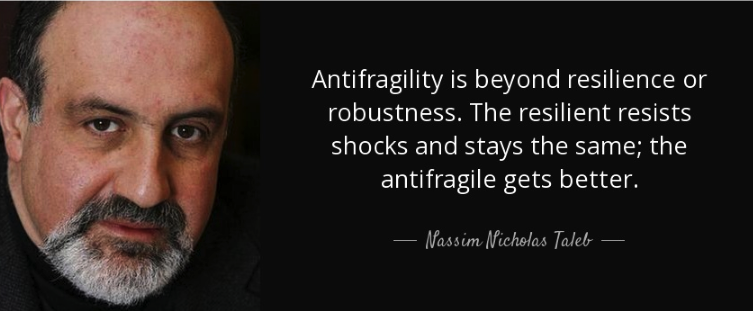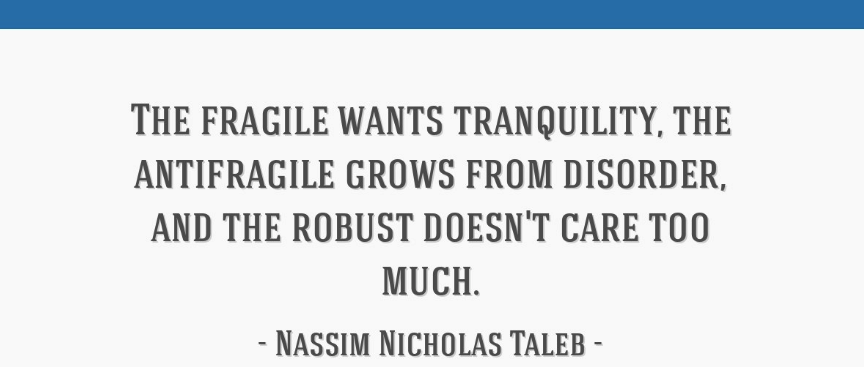We should prefer investing in businesses that are hard to kill. But how do we assess that?
In 1950s average life cycle of a business was around 80 years, today it is less than 20 years. Clearly, entrepreneurship is more like a deadly roller coaster than just a smooth sail. Disruption has always been prevalent but what has changed is the speed and complexity with which things get disrupted. Whenever one talks about disruption, one has to bring up anti-fragility and how important it is to have in a business. Such a business has the potential not just to survive the test of times but thrive in chaos. Businesses that have a very little rate of change, low dependence on suppliers/government and are run conservatively have a higher chance of surviving extremities like wars or full-blown recessions.
Last 100 years have witnessed many geopolitical events- starting with World War I that lasted four years. This was followed by the World War II which went on for six years. That in itself covers about a decade of extreme unrest. During the times of war, businesses practically shut down, stock markets are closed, the government’s only focus is on defence so there is negligible public spending, and economies are usually either on their last legs or in some cases are completely destroyed.
Apart from the geopolitical issues that we’ve had, survival during the major economic crisis has also been equally challenging- from the Great Depression in 1929 which lasted for an entire decade to the global financial crisis in 2008 led by the collapse of the housing market in the USA. The effects are similar to wars- stock markets crash leading to loss of billions of dollars of savings, major cutbacks leading to rising unemployment, fall in global trade resulting in recession in most economies and a sovereign debt crisis in some. All of this mostly leads to rising interest rates, inflation and a poor standard of living for those who survive.
Though India in itself wasn’t directly involved in the World Wars, since independence it too has had its fair share of geopolitical issues (multiple wars with Pakistan & China) and economic disruptions like that of early 1990s which led to opening up of the economy, Asian currency crisis of 1997, dot-com burst of 2000 to contagion effect of the financial crisis in 2008.
Keeping all the above in mind, there are more than a few companies which have seen the light at the end of the tunnel and are in fact blossoming to greater heights even today. We have made a list of such companies both of Indian origin as well as international. Though there are always some exceptions but certain common traits would be applicable to most of the companies that have survived – they are highly customer oriented, have consciously reduced dependence on the external environment, have stayed away from leveraging balance sheets and are run by focused management teams with proper succession planning in place.
Following are some of the popular Indian companies which have been in existence for over a century:
| Name of Company | Year of Establishment |
| Bennett Coleman (Pvt.) | 1838 |
| Shapoorji Pallonji (Pvt.) | 1865 |
| Bombay Dying Co. | 1879 |
| Dabur | 1884 |
| Kirloskar | 1888 |
| DCM | 1889 |
| Britannia | 1892 |
| Amrutanjan | 1893 |
| Century Textiles | 1897 |
| Godrej | 1897 |
| Cheviot Co. | 1897 |
| CESC | 1899 |
| Shalimar Paints | 1902 |
| Indian Hotels | 1902 |
| Mafatlal Group | 1905 |
| Alembic Group | 1907 |
| Tata Steel | 1907 |
| ITC | 1910 |
| Birla Corporation | 1910 |
| TVS | 1911 |
Some International Companies:
| Name of Company | Year of Establishment |
| Jim Beam (USA) | 1795 |
| Dupont (USA) | 1802 |
| Colgate (USA) | 1806 |
| Brooks Brothers (USA) | 1818 |
| Cadbury (UK) | 1824 |
| Fox’s (UK) | 1853 |
| Burberry (UK) | 1856 |
| Heineken (Dutch) | 1864 |
| Nestle (Switzerland) | 1866 |
| Jockey (USA) | 1876 |
| Coca-cola (USA) | 1892 |
| General Electric (USA) | 1892 |
| Bata (Czech Republic) | 1894 |
| Target (USA) | 1902 |
| Rolls Royce (UK) | 1906 |
| UPS (USA) | 1907 |
| Boeing (USA) | 1916 |
| BMW (Germany) | 1916 |
| Nikon (Japan) | 1917 |
Disclaimer: This is not a recommendation to Buy/Sell. Read complete disclaimer here .



Leave a Reply